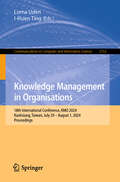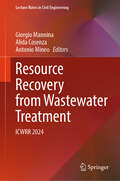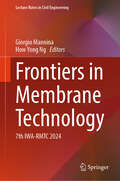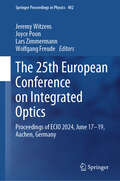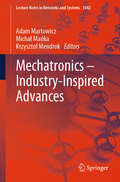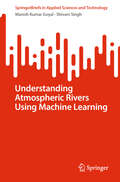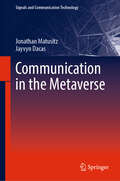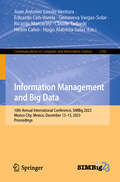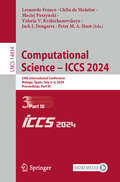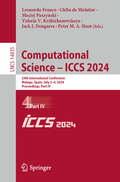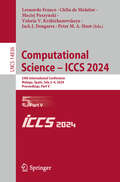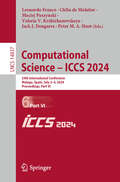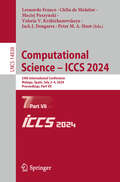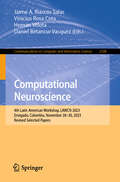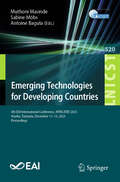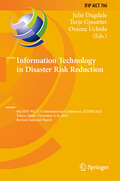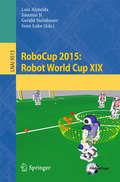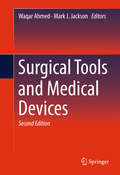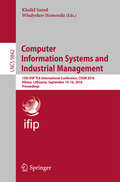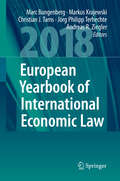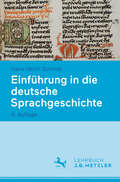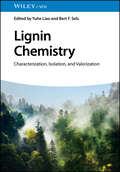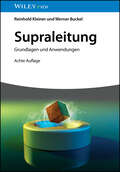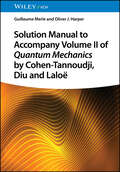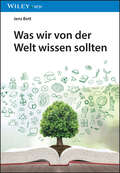- Table View
- List View
Knowledge Management in Organisations: 18th International Conference, KMO 2024, Kaohsiung, Taiwan, July 29 – August 1, 2024, Proceedings (Communications in Computer and Information Science #2152)
by Lorna Uden I-Hsien TingThis book constitutes the proceedings of the 18th International Conference on Knowledge management in Organizations, KMO 2024, which took place in Kaohsiung, Taiwan, during July 29–August 1, 2024 The 33 full papers were carefully reviewed and selected from 72 submissions. The papers are organized in subject areas as follows: Knowledge Transfer and Sharing; Knowledge in Business and Organisation; Innovation and Knowledge Creation; KM and Education; KM Process and Model; Information and Knowledge Management Systems; AI, IT and New Trends in KM; and Healthcare.
Resource Recovery from Wastewater Treatment: ICWRR 2024 (Lecture Notes in Civil Engineering #524)
by Giorgio Mannina Antonio Mineo Alida CosenzaThis volume highlights the latest advances, innovations, and applications in the field of water resource recovery from water treatment as presented by leading researchers at the International Conference on Wider-Uptake of Water Resource Recovery from Wastewater Treatment (ICWRR), held in Palermo, Italy on June 18-21, 2024. The event took place together with the 7th IWA Regional Membrane Technology Conference (IWA-RMTC). The contributions cover a wide range of themes from innovative and nature-based solutions for water and wastewater management to circularity assessment tools and environmental policy and legislation. The topics include resource recovery from wastewater, wastewater treatment, membrane bioreactors, greenhouse gases from wastewater treatment, LCA, water reuse & rainwater harvesting, mathematical modelling of wastewater treatment plants, metagenomics analysis and environmental microbiology, environmental policy and legislation in the water sector, plant-water-soil nexus, fertilizers from wastewater. The contributions were selected by means of a rigorous peer-review process and highlight many exciting ideas that will spur novel research directions and foster multidisciplinary collaboration among different water specialists.
Frontiers in Membrane Technology: 7th IWA-RMTC 2024 (Lecture Notes in Civil Engineering #525)
by Giorgio Mannina How Yong NgThis volume highlights the latest advances, innovations, and applications related to membrane technologies for water and wastewater treatment as presented by leading researchers at the 7th IWA Regional Membrane Technology Conference (IWA-RMTC), held in Palermo, Italy on June 18-21, 2024. The event took place together with the International Conference on Wider-Uptake of Water Resource Recovery from Wastewater Treatment (ICWRR). The contributions cover a wide range of topics such as membrane materials and configurations, hybrid membrane processes, drinking water treatment, domestic/industrial wastewater treatment, water reuse, resource recovery from wastewater, energy recovery from water and wastewater, desalination, membrane fouling mechanisms and control. The contributions were selected by means of a rigorous peer-review process and highlight many exciting ideas that will spur novel research directions and foster multidisciplinary collaboration among different water specialists.
The 25th European Conference on Integrated Optics: Proceedings of ECIO 2024, June 17–19, Aachen, Germany (Springer Proceedings in Physics #402)
by Jeremy Witzens Joyce Poon Lars Zimmermann Wolfgang FreudeThis volume presents peer-reviewed and selected papers from the 2024 European Conference on Integrated Optics (ECIO), held on 17-19 June, 2024, and organized by RWTH Aachen University, Germany, in collaboration with Max-Planck Institute of Microstructure Physics, Technical University of Berlin, Leibniz Institute for High Performance Microelectronics, and Karlsruhe Institute of Technology. In the 25th edition of this conference, internationally recognized experts share their latest research and showcase their products and services in the field of integrated optics, optoelectronics, and nano-photonics. The conference focuses on leading-edge research and its broad application scope ranges from tele/datacom, optical interconnects, and (bio) optical sensing to more disruptive areas such as quantum computing and programmable photonics.
Mechatronics – Industry-Inspired Advances (Lecture Notes in Networks and Systems #1042)
by Adam Martowicz Michał Mańka Krzysztof MendrokThis book addresses the key aspects concerning the rapid development of mechatronics. It also helps to understand the respective great significance of cooperation between researchers and professionals. Mechatronics is crucial for many areas of life. However, its invaluable contribution is particularly seen in the Fourth Industrial Revolution (Industry 4.0). In response to the current issues in mechatronics, the 6th International Conference Mechatronics 2023: Ideas for Industrial Applications was organized from 11 to 13 December 2023 in Krakow, Poland. The following topics were discussed: artificial intelligence, robotics, image processing, software, control systems, space applications, modeling and identification of mechatronic systems, smart materials, and prototype construction with 3D printing. This book provides the solutions ready for implementation in industry. These solutions grew out of the ideas exchange between the Conference attendees representing various backgrounds.
Understanding Atmospheric Rivers Using Machine Learning (SpringerBriefs in Applied Sciences and Technology)
by Manish Kumar Goyal Shivam SinghThis book delves into the characterization, impacts, drivers, and predictability of atmospheric rivers (AR). It begins with the historical background and mechanisms governing AR formation, giving insights into the global and regional perspectives of ARs, observing their varying manifestations across different geographical contexts. The book explores the key characteristics of ARs, from their frequency and duration to intensity, unraveling the intricate relationship between atmospheric rivers and precipitation. The book also focus on the intersection of ARs with large-scale climate oscillations, such as El Niño and La Niña events, the North Atlantic Oscillation (NAO), and the Pacific Decadal Oscillation (PDO). The chapters help understand how these climate phenomena influence AR behavior, offering a nuanced perspective on climate modeling and prediction. The book also covers artificial intelligence (AI) applications, from pattern recognition to prediction modeling and early warning systems. A case study on AR prediction using deep learning models exemplifies the practical applications of AI in this domain. The book culminates by underscoring the interdisciplinary nature of AR research and the synergy between atmospheric science, climatology, and artificial intelligence
Communication in the Metaverse (Signals and Communication Technology)
by Jonathan Matusitz Jayvyn DacasThis book explores the diverse methods and facets of communication in the metaverse, from interpersonal relationships to health communication, and from collaboration in the workplace to social interaction in educational contexts. More specifically, the book analyses the profound interplay between the metaverse and the larger communicative context in which it is entrenched. In this manner, the work concentrates on the factors underlying its origins, development, actualization, and popularity, as well as the fundamental discords, uncertainties, and dangers that can have serious consequences on both society and the individual. Explores diverse methods of communication in the metaverse, from interpersonal relationships to health communication; Analyses the interplay between the metaverse and the larger communicative context in which it is entrenched; Concentrates on the metaverse’s popularity and potential as well as the discords and dangers it presents.
Information Management and Big Data: 10th Annual International Conference, SIMBig 2023, Mexico City, Mexico, December 13–15, 2023, Proceedings (Communications in Computer and Information Science #2142)
by Juan Antonio Lossio-Ventura Hugo Alatrista-Salas Hiram Calvo Genoveva Vargas-Solar Eduardo Ceh-Varela Ricardo Marcacini Claude TadonkiThis book constitutes the refereed proceedings of the 10th Annual International Conference on Information Management and Big Data, SIMBig 2023, held in Mexico City, Mexico, during December 13–15, 2023. The 19 full papers and 6 short papers included in this book were carefully reviewed and selected from 64 submissions. SIMBig 2023 introduced innovative approaches for analyzing and handling datasets as well as new methods based on Artificial Intelligence (AI), Data Science, Machine Learning, Natural Language Processing, Semantic Web, Data-driven Software Engineering, Health Informatics, and more.
Computational Science – ICCS 2024: 24th International Conference, Malaga, Spain, July 2–4, 2024, Proceedings, Part III (Lecture Notes in Computer Science #14834)
by Valeria V. Krzhizhanovskaya Jack J. Dongarra Peter M. A. Sloot Maciej Paszynski Clélia De Mulatier Leonardo FrancoThe 7-volume set LNCS 14832 – 14838 constitutes the proceedings of the 24th International Conference on Computational Science, ICCS 2024, which took place in Malaga, Spain, during July 2–4, 2024. The 155 full papers and 70 short papers included in these proceedings were carefully reviewed and selected from 430 submissions. They were organized in topical sections as follows: Part I: ICCS 2024 Main Track Full Papers; Part II: ICCS 2024 Main Track Full Papers; Part III: ICCS 2024 Main Track Short Papers; Advances in High-Performance Computational Earth Sciences: Numerical Methods, Frameworks and Applications; Artificial Intelligence and High-Performance Computing for Advanced Simulations; Part IV: Biomedical and Bioinformatics Challenges for Computer Science; Computational Health; Part V: Computational Optimization, Modelling, and Simulation; Generative AI and Large Language Models (LLMs) in Advancing Computational Medicine; Machine Learning and Data Assimilation for Dynamical Systems; Multiscale Modelling and Simulation; Part VI: Network Models and Analysis: From Foundations to Artificial Intelligence; Numerical Algorithms and Computer Arithmetic for Computational Science; Quantum Computing; Part VII: Simulations of Flow and Transport: Modeling, Algorithms and Computation; Smart Systems: Bringing Together Computer Vision, Sensor Networks, and Artificial Intelligence; Solving Problems with Uncertainties; Teaching Computational Science
Computational Science – ICCS 2024: 24th International Conference, Malaga, Spain, July 2–4, 2024, Proceedings, Part IV (Lecture Notes in Computer Science #14835)
by Valeria V. Krzhizhanovskaya Jack J. Dongarra Peter M. A. Sloot Maciej Paszynski Clélia De Mulatier Leonardo FrancoThe 7-volume set LNCS 14832 – 14838 constitutes the proceedings of the 24th International Conference on Computational Science, ICCS 2024, which took place in Malaga, Spain, during July 2–4, 2024. The 155 full papers and 70 short papers included in these proceedings were carefully reviewed and selected from 430 submissions. They were organized in topical sections as follows: Part I: ICCS 2024 Main Track Full Papers; Part II: ICCS 2024 Main Track Full Papers; Part III: ICCS 2024 Main Track Short Papers; Advances in High-Performance Computational Earth Sciences: Numerical Methods, Frameworks and Applications; Artificial Intelligence and High-Performance Computing for Advanced Simulations; Part IV: Biomedical and Bioinformatics Challenges for Computer Science; Computational Health; Part V: Computational Optimization, Modelling, and Simulation; Generative AI and Large Language Models (LLMs) in Advancing Computational Medicine; Machine Learning and Data Assimilation for Dynamical Systems; Multiscale Modelling and Simulation; Part VI: Network Models and Analysis: From Foundations to Artificial Intelligence; Numerical Algorithms and Computer Arithmetic for Computational Science; Quantum Computing; Part VII: Simulations of Flow and Transport: Modeling, Algorithms and Computation; Smart Systems: Bringing Together Computer Vision, Sensor Networks, and Artificial Intelligence; Solving Problems with Uncertainties; Teaching Computational Science
Computational Science – ICCS 2024: 24th International Conference, Malaga, Spain, July 2–4, 2024, Proceedings, Part V (Lecture Notes in Computer Science #14836)
by Valeria V. Krzhizhanovskaya Jack J. Dongarra Peter M. A. Sloot Maciej Paszynski Clélia De Mulatier Leonardo FrancoThe 7-volume set LNCS 14832 – 14838 constitutes the proceedings of the 24th International Conference on Computational Science, ICCS 2024, which took place in Malaga, Spain, during July 2–4, 2024. The 155 full papers and 70 short papers included in these proceedings were carefully reviewed and selected from 430 submissions. They were organized in topical sections as follows: Part I: ICCS 2024 Main Track Full Papers; Part II: ICCS 2024 Main Track Full Papers; Part III: ICCS 2024 Main Track Short Papers; Advances in High-Performance Computational Earth Sciences: Numerical Methods, Frameworks and Applications; Artificial Intelligence and High-Performance Computing for Advanced Simulations; Part IV: Biomedical and Bioinformatics Challenges for Computer Science; Computational Health; Part V: Computational Optimization, Modelling, and Simulation; Generative AI and Large Language Models (LLMs) in Advancing Computational Medicine; Machine Learning and Data Assimilation for Dynamical Systems; Multiscale Modelling and Simulation; Part VI: Network Models and Analysis: From Foundations to Artificial Intelligence; Numerical Algorithms and Computer Arithmetic for Computational Science; Quantum Computing; Part VII: Simulations of Flow and Transport: Modeling, Algorithms and Computation; Smart Systems: Bringing Together Computer Vision, Sensor Networks, and Artificial Intelligence; Solving Problems with Uncertainties; Teaching Computational Science
Computational Science – ICCS 2024: 24th International Conference, Malaga, Spain, July 2–4, 2024, Proceedings, Part VI (Lecture Notes in Computer Science #14837)
by Valeria V. Krzhizhanovskaya Jack J. Dongarra Peter M. A. Sloot Maciej Paszynski Clélia De Mulatier Leonardo FrancoThe 7-volume set LNCS 14832 – 14838 constitutes the proceedings of the 24th International Conference on Computational Science, ICCS 2024, which took place in Malaga, Spain, during July 2–4, 2024. The 155 full papers and 70 short papers included in these proceedings were carefully reviewed and selected from 430 submissions. They were organized in topical sections as follows: Part I: ICCS 2024 Main Track Full Papers; Part II: ICCS 2024 Main Track Full Papers; Part III: ICCS 2024 Main Track Short Papers; Advances in High-Performance Computational Earth Sciences: Numerical Methods, Frameworks and Applications; Artificial Intelligence and High-Performance Computing for Advanced Simulations; Part IV: Biomedical and Bioinformatics Challenges for Computer Science; Computational Health; Part V: Computational Optimization, Modelling, and Simulation; Generative AI and Large Language Models (LLMs) in Advancing Computational Medicine; Machine Learning and Data Assimilation for Dynamical Systems; Multiscale Modelling and Simulation; Part VI: Network Models and Analysis: From Foundations to Artificial Intelligence; Numerical Algorithms and Computer Arithmetic for Computational Science; Quantum Computing; Part VII: Simulations of Flow and Transport: Modeling, Algorithms and Computation; Smart Systems: Bringing Together Computer Vision, Sensor Networks, and Artificial Intelligence; Solving Problems with Uncertainties; Teaching Computational Science
Computational Science – ICCS 2024: 24th International Conference, Malaga, Spain, July 2–4, 2024, Proceedings, Part VII (Lecture Notes in Computer Science #14838)
by Valeria V. Krzhizhanovskaya Jack J. Dongarra Peter M. A. Sloot Maciej Paszynski Clélia De Mulatier Leonardo FrancoThe 7-volume set LNCS 14832 – 14838 constitutes the proceedings of the 24th International Conference on Computational Science, ICCS 2024, which took place in Malaga, Spain, during July 2–4, 2024. The 155 full papers and 70 short papers included in these proceedings were carefully reviewed and selected from 430 submissions. They were organized in topical sections as follows: Part I: ICCS 2024 Main Track Full Papers; Part II: ICCS 2024 Main Track Full Papers; Part III: ICCS 2024 Main Track Short Papers; Advances in High-Performance Computational Earth Sciences: Numerical Methods, Frameworks and Applications; Artificial Intelligence and High-Performance Computing for Advanced Simulations; Part IV: Biomedical and Bioinformatics Challenges for Computer Science; Computational Health; Part V: Computational Optimization, Modelling, and Simulation; Generative AI and Large Language Models (LLMs) in Advancing Computational Medicine; Machine Learning and Data Assimilation for Dynamical Systems; Multiscale Modelling and Simulation; Part VI: Network Models and Analysis: From Foundations to Artificial Intelligence; Numerical Algorithms and Computer Arithmetic for Computational Science; Quantum Computing; Part VII: Simulations of Flow and Transport: Modeling, Algorithms and Computation; Smart Systems: Bringing Together Computer Vision, Sensor Networks, and Artificial Intelligence; Solving Problems with Uncertainties; Teaching Computational Science
Computational Neuroscience: 4th Latin American Workshop, LAWCN 2023, Envigado, Colombia, November 28–30, 2023, Revised Selected Papers (Communications in Computer and Information Science #2108)
by Vinícius Rosa Cota Jaime A. Riascos Salas Hernán Villota Daniel Betancur VasquezThis book constitutes the refereed proceedings of the 4th Latin American Workshop, LAWCN 2023, held in Envigado, Colombia, during November 28–30, 2023. The 8 full papers and 2 short papers included in this book were carefully reviewed and selected from 50 submissions. They were organized in topical sections as follows: artificial intelligence and machine learning; computational neuroscience; and brain-computer interfaces.
Emerging Technologies for Developing Countries: 6th EAI International Conference, AFRICATEK 2023, Arusha, Tanzania, December 11–13, 2023, Proceedings (Lecture Notes of the Institute for Computer Sciences, Social Informatics and Telecommunications Engineering #520)
by Muthoni Masinde Antoine Bagula Sabine MöbsThis book constitutes the refereed conference proceedings of the 6th EAI International Conference on Emerging Technologies for Developing Countries, AFRICATEK 2023, held in Arusha, Tanzania, during December 11–13, 2023. The 11 full papers in this book were carefully reviewed and selected from 39 submissions. They were organized in topical sections as follows: smart infrastructure and urban management; data security and digital technologies; economic growth and social development; health and well-being; and sustainability and environmental management.
Information Technology in Disaster Risk Reduction: 8th IFIP WG 5.15 International Conference, ITDRR 2023, Tokyo, Japan, December 4–6, 2023, Revised Selected Papers (IFIP Advances in Information and Communication Technology #706)
by Julie Dugdale Terje Gjøsæter Osamu UchidaThis volume constitutes the refereed and revised post-conference proceedings of the 8th IFIP WG 5.15 International Conference on Information Technology in Disaster Risk Reduction, ITDRR 2023, held in Tokyo, Japan, during December 4-6, 2023. The 18 full papers were carefully reviewed and selected from 26 submissions. The papers were organized in topical sections as follows: Evacuation and Emergency Management; Situational Awareness; Social Media; Information Systems; Geographic Information System (GIS); and Healthcare.
RoboCup 2015: Robot World Cup XIX (Lecture Notes in Computer Science #9513)
by Luis Almeida Jianmin Ji Gerald Steinbauer Sean LukeThis book is the Proceedings of the 19th Annual RoboCup International Symposium, held in Hefei, China, in July 2015.The book contains 20 papers presented at the Symposium, carefully selected from 39 submissions. Additionally the book contains 11 champion team papers and one paper from the Workshop on Benchmarking Service Robots. The papers present current research in robotics, artificial intelligence, computer vision, multiagent systems, simulation, and other areas.
Surgical Tools and Medical Devices
by Mark J. Jackson Waqar AhmedThis new edition presents information and knowledge on the field of biomedical devices and surgical tools. The authors look at the interactions between nanotechnology, nanomaterials, design, modeling, and tools for surgical and dental applications, as well as how nanostructured surfaces can be created for the purposes of improving cell adhesion between medical devices and the human body. Each original chapter is revised in this second edition and describes developments in coatings for heart valves, stents, hip and knee joints, cardiovascular devices, orthodontic applications, and regenerative materials such as bone substitutes. There are also 8 new chapters that address:Microvascular anastomosesInhaler devices used for pulmonary delivery of medical aerosolsSurface modification of interference screwsBiomechanics of the mandible (a detailed case study)Safety and medical devicesThe synthesis of nanostructured materialDelivery of anticancer molecules using carbon nanotubesNano and micro coatings for medical devicesThis book is appropriate for engineers, material scientists, chemists, physicists, biologists, medical and dental professionals with an interest in biomedical devices and tools, and researchers in the same fields.
Computer Information Systems and Industrial Management: 15th IFIP TC8 International Conference, CISIM 2016, Vilnius, Lithuania, September 14-16, 2016, Proceedings (Lecture Notes in Computer Science #9842)
by Khalid Saeed Władysław HomendaThis book constitutes the proceedings of the 15th IFIP TC8 International Conference on Computer Information Systems and Industrial Management, CISIM 2016, held in Vilnius, Lithuania, in September 2016. The 63 regular papers presented together with 1 inivted paper and 5 keynotes in this volume were carefully reviewed and selected from about 89 submissions. The main topics covered are rough set methods for big data analytics; images, visualization, classification; optimization, tuning; scheduling in manufacturing and other applications; algorithms; decisions; intelligent distributed systems; and biometrics, identification, security.
European Yearbook of International Economic Law 2018 (European Yearbook of International Economic Law #9)
by Markus Krajewski Jörg Philipp Terhechte Marc Bungenberg Andreas R. Ziegler Christian J. TamsVolume 9 of the EYIEL focusses on natural resources law understood as a special area of international economic law. In light of increasing conflicts over access to and the use of natural resources and of their impact on political, social and environmental aspects, the contributions of this volume analyse to which extent international economic law can contribute to the sustainable exploitation, management and distribution of natural resources. The volume collects contributions on general principles of natural resources law, the importance of natural resources for trade, investment and European economic law as well as analyses of particular sectors and areas including fracking, timber, space and deep seabed mining and natural resources in the arctic region.In its section on regional developments, EYIEL 9 addresses two regional integration systems which are usually not at the centre of public interest, but which deserve all the more attention due to their special relations with Europe: The Eurasian Economic Union and the Caribbean Community (CARICOM). Further EYIEL sections address recent WTO and investment case law as well as developments at the IMF. The volume also contains review essays of important recent books in international economic law and other aspects of international law which are connected to international economic relations.The chapter "Sovereignty, Ownership and Consent in Natural Resource Contracts: From Concepts to Practice" by Lorenzo Cotula is open access under a CC BY 4.0 license via link.springer.com.
Einführung in die deutsche Sprachgeschichte
by Hans Ulrich SchmidDiese Einführung bietet einen Überblick über die Entwicklung der deutschen Sprache vom Althochdeutschen bis zum Frühneuhochdeutschen mit Ausblicken auf die jüngere Sprachgeschichte und die Gegenwartssprache. Soweit es für das Verständnis heutiger oder historischer Sprachformen notwendig ist, wird auch das Germanische und Indogermanische einbezogen. Der Autor stellt die Sprachentwicklung auf den verschiedenen Ebenen dar: Laut und Schrift, Bildung von Wörtern und Wortformen, Wortschatz, Syntax und Semantik (Bedeutungswandel). Mit Tabellen (zu Laut- und Flexionsparadigmen) und Überblicksdarstellungen, Abbildungen, Textbeispielen und Analysen sowie vertiefenden Literaturhinweisen. – Für die vierte Auflage wurde der Band komplett durchgesehen und aktualisiert.
Lignin Chemistry: Characterization, Isolation, and Valorization
by Bert F. Sels Yuhe LiaoLignin Chemistry A thorough reference guide to Lignin Chemistry, from inherent structure revealing to transformation into chemicals, fuels, and materials Climate change, driven by rising greenhouse gas emissions, is the defining challenge of our time. Reducing our dependence on non-renewable resources such as fossil fuels will require alternative, more sustainable resources. Lignin, the only widely-occurring, renewable, aromatic bio-polymer in Nature, has a range of application potential in the production of chemicals, fuels, and other industrial materials. Lignin science has become one of the fastest-growing and most significant areas of sustainable chemistry in the world. Lignin Chemistry: Characterization, Isolation, and Valorization presents a systematic, multidisciplinary overview of this cutting-edge field and its current state of research. Beginning with a robust characterization of lignin, the book addresses the isolation and transformation of lignin, as well as the book inspires with a plethora of applications. The result is a critical resource for researchers and professionals in any area of academic or industry where renewable biomass, in particular lignin, has importance. Lignin Chemistry readers will find: Thermochemical and catalytic strategies for lignin conversionDetailed discussion of the valorization of lignin towards biopolymers, nanoparticles, carbon fibers and materials, and hydrogelsAn authorial team with immense and varied research experience Lignin Chemistry is ideal for chemical engineers, catalytic chemists, biochemists, material scientists, and analytical chemists in industry.
Supraleitung: Grundlagen und Anwendungen
by Werner Buckel Reinhold KleinerSupraleitung Seit mehr als 50 Jahren das maßgebliche deutschsprachige Lehrbuch zur Supraleitung Supraleitung, also das Verschwinden des elektrischen Widerstands in Materialien unterhalb einer kritischen Temperatur, ist längst kein Kuriosum mehr, sondern ein Phänomen, das zahlreiche Anwendungen gefunden hat, etwa zur Erzeugung und Detektion von Magnetfeldern, in der Sensorik (SQUIDs), zur zerstörungsfreien Materialprüfung, in Energietransport und -umwandlung und in der magnetischen Energiespeicherung. Die achte Auflage des Standard-Lehrbuchs zur Supraleitung folgt dem bewährten Ansatz, das physikalische Phänomen der Supraleitung in seinen zahlreichen Facetten möglichst anschaulich und ohne allzu viel mathematischen Ballast zu erklären. Ausgehend von einem Überblick über die wichtigsten, zum Verständnis benötigen quantenmechanischen Grundlagen behandelt das Buch die unterschiedlichen Supraleiter-Materialklassen, etwa die metallischen Supraleiter, Kuprate und Eisenpniktide. Die Schwerpunkte liegen dabei auf den Eigenschaften, der Herstellung und der Stabilität dieser Materialien. Die folgenden Kapitel beleuchten die Erklärungsmodelle der Supraleitung, die Thermodynamik des supraleitenden Zustands sowie dessen Zusammenbrechen. Ausführlich geht das Buch auf die für den praktischen Nutzen so wichtigen Josephson-Kontakte ein. Das letzte Kapitel widmet sich den zahlreichen Anwendungen der Supraleitung, zum Beispiel supraleitende Kabel, in der Kernspintomographie, der Kernfusion, der SQUID-Sensorik sowie der Mikroelektronik. Für die Neuauflage wurde das Buch vollständig überarbeitet und mit Elementen angereichert, die das Verständnis fördern und das Lernen erleichtern wie etwa Kapiteleinführungen, Exkurse zur Messmethodik, mehr durchgerechnete Beispiele, Boxen zur Vertiefung weiterführender Aspekte und Kapitelzusammenfassungen.
Solution Manual to Accompany Volume II of Quantum Mechanics by Cohen-Tannoudji, Diu and Laloë
by Guillaume Merle Oliver J. HarperProvides detailed solutions to all 47 problems in the seminal textbook Quantum Mechanics, Volume II With its counter-intuitive premises and its radical variations from classical mechanics or electrodynamics, quantum mechanics is among the most important and challenging components of a modern physics education. Students tackling quantum mechanics curricula generally practice by working through increasingly difficult problem sets that demand both a theoretical grounding and a solid understanding of mathematical technique. Solution Manual to Accompany Volume II of Quantum Mechanics by Cohen-Tannoudji, Diu and Laloë is designed to help you grasp the fundamentals of quantum mechanics by doing. This essential set of solutions provides explicit explanations of every step, focusing on the physical theory and formal mathematics needed to solve problems with varying degrees of difficulty. Contains in-depth explanations of problems concerning quantum mechanics postulates, mathematical tools, approximation methods, and moreCovers topics including perturbation theory, addition of angular momenta, electron spin, systems of identical particles, time-dependent problems, and quantum scattering theoryGuides readers on transferring the solution approaches to comparable problems in quantum mechanicsIncludes numerous figures that demonstrate key steps and clarify key concepts Solution Manual to Accompany Volume II of Quantum Mechanics by Cohen-Tannoudji, Diu and Laloë is a must-have for students in physics, chemistry, or the materials sciences wanting to master these challenging problems, as well as for instructors looking for pedagogical approaches to the subject.
Was wir von der Welt wissen sollten
by Jens BottDas Buch zum Mitreden in aktuellen Debatten in Wissenschaft und Gesellschaft Der Wunsch, die Welt verstehen zu wollen, ist so alt wie die Menschheit; wir suchen nach Erklärungen, benötigen Halt und Orientierung. Aus Annahmen und Überzeugungen, die uns plausibel erscheinen, formen wir unsere Weltbilder, Vorstellungen über die Beschaffenheit des Universums. Die jeweils herrschenden Vorstellungen haben sich mit der Zeit allerdings verändert. Bis zum Ende des Mittelalters lagen die Dinge noch einfach: Für die Menschen in Europa etwa war die Bibel die Quelle aller Wahrheit, ein universelles Sachbuch, das die Entstehung des Universums, die Artenvielfalt und den Ursprung des Sprachengewirrs erklärte, aber auch moralische Richtlinien vorgab. Mit der Zeit hat sich eine Reihe zentraler Theorien und Ideen herausgeschält, die den heutigen Wissenschafts-und Politikbetrieb prägen. Gleich, ob wir sie nun persönlich für richtig halten oder nicht, haben diese herrschenden Meinungen Einfluss auf unser tägliches Leben – und das mehr, als uns oftmals bewusst ist. Im ersten Teil des Buches (Die Natur) werden nach Darstellung der Grundlagendisziplin Mathematik zunächst die physikalischen Naturgesetze dargelegt, um dann zu zeigen, wie sich aus ihnen die Chemie und aus der Chemie die Biologie ergibt. Im Mittelpunkt stehen Newtons Mechanik, die Relativitätstheorie, die Quantenphysik und Darwins Evolutionstheorie. Das abschließende Kapitel erzählt die Naturgeschichte vom Urknall bis zum Erscheinen des Homo sapiens und fasst dabei die wesentlichen Aussagen noch einmal zusammen. Das erste Kapitel des zweiten Teils (Der Mensch) beschäftigt sich mit dem menschlichen Bewusstsein und leitet aus einer naturwissenschaftlichen Perspektive zu den geisteswissenschaftlichen Kapiteln Sprache (Ausdrucksform des Bewusstseins), Philosophie (Geschichte des Denkens), Gesellschaft (Theorie des Zusammenlebens) und Ökonomie (Umgang mit knappen Ressourcen) über. Das abschließende Kapitel erzählt die Menschheitsgeschichte bis heute, wobei wiederum die zentralen Aussagen noch einmal zusammengefasst werden.
